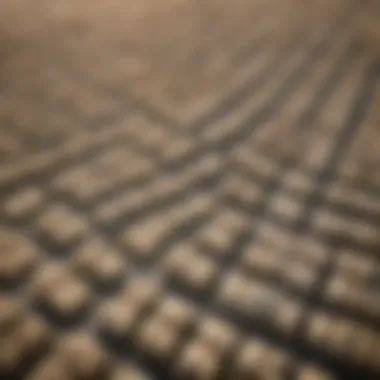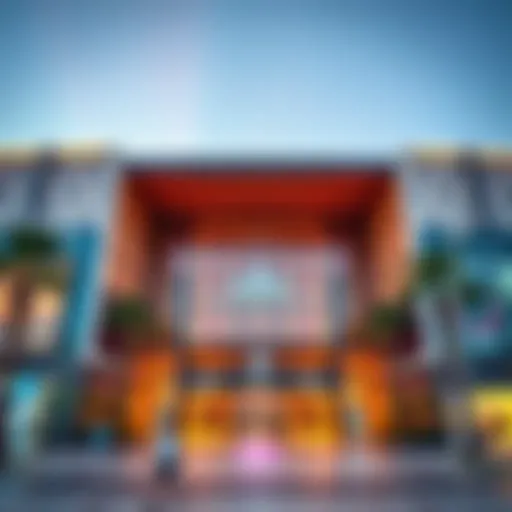Analyzing Dubai's Real Estate Market Trends and Strategies


Intro
Dubai’s real estate market has emerged as a global icon of luxury and opportunity. It’s hard to ignore the striking skyline adorned with architectural marvels like the Burj Khalifa or the Palm Jumeirah. However, beneath this glamorous exterior lies a complex landscape, teeming with potential yet laden with intricacies that can baffle even seasoned investors. Whether you are looking to buy a penthouse or a modest apartment, understanding the underlying dynamics is critical.
The purpose of this article is to unpack the layers of this vibrant market. We will look into the latest trends shaping property values, scrutinize the costs associated with buying or renting, and explore various investment strategies. Our exploration doesn’t leave behind the regulatory framework that governs real estate transactions, which can often seem like navigating a maze. Finally, by blending seasoned insight with detailed analysis, this guide aims to equip both experienced and novice stakeholders with the knowledge needed to thrive in Dubai’s real estate scene.
Understanding the Dubai Real Estate Market
The real estate market in Dubai is a vibrant, complex ecosystem that plays a crucial role in the economic framework of the region. Understanding this landscape is essential for anyone considering entering the market—be it investors, buyers, or even agents. The dynamics of Dubai’s property scene are influenced by a myriad of variables, from the economic climate and governmental policies to consumer preferences and international investor behavior.
By grasping these nuances, stakeholders can make informed decisions that align their interests with market opportunities. The phrase "location, location, location" holds just as much in Dubai as in any global real estate hub, but it is underpinned by factors unique to the emirate. Notably, the city's innovative spirit, status as a trade hub, and its rapidly evolving infrastructure amplify its allure.
Overview of the Market Dynamics
Diving into the market dynamics, it is clear that Dubai has transformed from a modest fishing port into a bustling metropolis. The property market here is segmented into several layers—luxury residential, commercial properties, and industrial areas. Each segment has its own characteristics and dynamics that prospective buyers need to be aware of.
For instance, premium areas like Downtown Dubai and Dubai Marina are sought after for their proximity to amenities and the luxurious lifestyle they offer. On the flip side, areas on the city's periphery are witnessing growth as new projects sprout, appealing particularly to first-time buyers and those looking for affordable housing.
Key observations include:
- The supply-demand balance has a dynamic nature, often fluctuating due to global economic conditions.
- Trends like co-living spaces and smart homes are gaining traction, reflecting changing preferences among younger buyers.
- Regulatory changes can significantly impact prices and supply, needing constant monitoring by investors.
Impact of Economic Factors
The economic factors affecting Dubai's real estate market are multifold. Economic growth, inflation rates, and exchange rates play essential roles in shaping buyer confidence and investment potential. In recent years, fluctuations in oil prices have influenced the emirate’s economy, causing ripple effects throughout the property market. A sustained drop in oil prices can lead to decreased investor confidence and thus a slowdown in real estate transactions.
Moreover, the UAE's efforts to diversify its economy have strengthened the property sector. Initiatives like Expo 2020 have showcased Dubai to a global audience, enticing foreign investment. Additionally, favorable visa regulations and tax advantages attract expatriates seeking to make Dubai their home.
Highlighting the interconnectedness of these factors is key:
"Economic stability encourages investment, while regulatory environments shape buyer activities and market behaviors."
Consideration of the local economic landscape, coupled with global market conditions, is vital for anyone involved in the Dubai real estate sector. The ability to predict trends can mean the difference between a wise investment and a missed opportunity.
Key Neighborhoods in Dubai
The essence of the Dubai real estate market cannot be fully grasped without focusing on its neighborhoods. Each area offers its unique charm, amenities, and opportunities, catering to a spectrum of preferences and investments. Understanding these neighborhoods is critical for any potential buyer or investor. Focus on specific elements such as location, lifestyle, and potential growth helps to paint a broader picture of what makes each place worthy of attention. The dynamics of these neighborhoods not only reflect the overall health of the real estate market but also influence individual investment strategies.
Downtown Dubai: The Heart of Luxury
Residential Attributes
Downtown Dubai stands as a beacon of luxury living. The apartments and penthouses here have been designed with not just opulence but also comfort in mind. This area is jam-packed with shopping, dining, and entertainment options, making it a highly sought-after residential locale. The key characteristic of Downtown Dubai is its proximity to iconic landmarks such as the Burj Khalifa and The Dubai Mall, setting it apart as a major cultural hub. Living here comes with advantages such as lively nightlife and community events but may also pose challenges, like higher living costs and crowded outdoor spaces.
Investment Potential
The investment potential in Downtown Dubai is robust. This area typically sees strong demand due to its global appeal, ensuring good rental yields. Investors can tap into a lively market, with a steady influx of tourists and expatriates seeking short and long-term stays. A unique feature of this investment landscape is the continuous development of luxury projects that cater to a discerning audience. Despite the high purchase prices, the area offers solid capital appreciation, making it a beneficial choice for investors looking to maximize returns.
Dubai Marina: A Waterfront Paradise
Lifestyle Appeal
Dubai Marina, known for its breathtaking waterfront views, encapsulates a lifestyle of luxury. With numerous restaurants, shopping centers, and proximity to the beach, this district is vibrant and appealing. The key characteristic of the Dubai Marina lifestyle is its blend of relaxation and entertainment. Residents can enjoy serene walks along the promenade or indulge in exciting nightlife options. The unique aspect here is the community vibe created by the juxtaposition of waterfront activities and urban living; however, one should consider potential noise from nightlife as a disadvantage.
Market Trends
The real estate market in Dubai Marina is influenced heavily by its attractive lifestyle offerings. Current trends show an uptick in both property values and rental prices, a testament to its ongoing popularity. The unique rental model, which includes furnished apartments that appeal to both short-term tourists and long-term renters, enhances its marketability. Despite fluctuating demand, the overall market remains resilient due to the area's undeniable allure.


Jumeirah: Coastal Charm and Elegance
Community Overview
Jumeirah embodies an upscale coastal lifestyle, featuring luxurious villas and serene beaches. The community here is known for its family-friendly atmosphere, complemented by high-quality schools and healthcare facilities. The key characteristic of Jumeirah is its peaceful residential layout, which contrasts sharply with the bustling city life just a stone's throw away. Unique features like private beach access and low-rise buildings contribute to the area's charm. This balance of tranquility and accessibility makes Jumeirah an attractive choice, though potential buyers must be mindful of the premium property prices.
Development Projects
Development projects in Jumeirah focus on enhancing its appeal while maintaining its residential integrity. Recent projects cater to those looking for spacious living environments while delivering modern conveniences. The unique aspect of these developments is their blend of traditional architectural styles with contemporary designs, aiming to attract both families and expatriates. However, prospective investors should consider the potential risks associated with development delays and market saturation in high-end residential segments.
Palm Jumeirah: Iconic Living Experience
Unique Features
Palm Jumeirah is an architectural marvel and offers its residents a truly iconic living experience. Its unique palm-shaped design creates an exclusive atmosphere, with beach access to luxury resorts and private properties. One key characteristic of this area is the sense of community fostered by high-end living combined with recreational facilities. The direct access to the sea brings advantages like water sports and stunning sunsets, but buyers must weigh these benefits against potential overcrowding during peak tourist seasons.
Investment Opportunities
There's no denying that Palm Jumeirah offers compelling investment opportunities. Its exclusivity and branding have cemented its status as a premier destination, ensuring high demand for property. High rental yields and exceptional resale values are standout benefits for potential investors. However, challenges can arise due to fluctuating property values linked to global economic trends. Navigating these complexities requires a clear understanding of the market fluctuations characteristic of luxury properties.
Investment Strategies for Buyers
When looking to invest in real estate in Dubai, crafting the right strategies can make a world of difference. The importance of establishing effective investment strategies lies in their potential to maximize returns, mitigate risks, and navigate the complex market landscape. With unique opportunities presented by Dubai’s dynamic environment, it’s essential to understand the specific elements at play, benefits of smart strategies, and various considerations that can steer the investor's course toward success.
Understanding Market Cycles
The first step in any investment strategy is grasping market cycles. In Dubai, like anywhere else, real estate markets go through phases: expansion, peak, contraction, and recovery. Knowing where the market stands can help you plan better. For instance, during the expansion phase, prices are on the rise, making it an attractive time to purchase before they escalate further. On the contrary, during a contraction, prices might plummet, presenting a chance for savvy investors to snag bargains.
Here are some things to keep in mind:
- Timing is everything: Market research can help you pinpoint when to enter or exit.
- Historical data: Past market behaviors can be a guiding light, but every cycle can have its quirks too, so don’t take it at face value.
- Economic factors: Look at local employment rates, tourism trends, and global economic shifts to anticipate market movements.
"In real estate, success often comes down to timing and patience more than luck."
Identifying High-Value Properties
Next on the agenda is pinpointing high-value properties. In a bustling market like Dubai's, sifting through numerous options can feel like looking for a needle in a haystack. However, knowing what to look for can simplify the process significantly.
Some key indicators help identify properties with high potential for appreciation:
- Location: Proximity to major transport links, schools, and hospitals can elevate a property’s value.
- Amenities: Properties with pools, gyms, and security tend to attract more buyers.
- Market demand: High demand areas usually fetch higher prices—investors might want to focus on regions with a growing expatriate community.
- Quality Developments: Older buildings may come at a lower cost but consider their upkeep. Investing in newer developments can sometimes save you from unforeseen expenses down the road.
Exploring Off-Plan Developments
Lastly, let’s delve into off-plan developments, which are often overlooked by investors. Buying a property before it is built can seem risky, but when done right, it offers significant rewards. The key benefits include:
- Lower prices than completed properties, allowing buyers a larger investment for their money.
- Flexibility: Buyers can often customize their units, which can further heighten desirability when it comes time to rent or sell.
- High returns: As the project nears completion, property values typically rise, enhancing the investor’s capital growth potential.
However, consider these precautions:
- Developer track record: Researching the developer’s history can mitigate the risk of projects not meeting completion deadlines.
- Market conditions: Trends at the time of completion will influence the return on investment. Keep your ear to the ground on market forecasts.
In wrapping up first forays into investing in Dubai’s real estate, it becomes glaringly evident that smart strategies can pave the way for significant gains and satisfaction. Tailoring your investment approach, understanding market cycles, scouting out high-value properties, and being open to off-plan options can maximize your success in this vibrant city.
Legal Considerations in Real Estate
Understanding the legal landscape when it comes to real estate in Dubai is as vital as picking the right neighborhood. This section sheds light on important aspects regarding ownership, regulatory frameworks, and registration processes that every investor or buyer should be aware of. Legal considerations serve not just as guidelines but as protection against unforeseen issues that can arise post-purchase.
Understanding Ownership Structures


Ownership structures in Dubai can be a bit of a maze for those not familiar with the region. It's crucial to understand the types of ownership available.
- Freehold Ownership: This allows foreign buyers the right to own property outright in designated areas. It's a coveted arrangement because it grants full control.
- Leasehold Ownership: Here, the buyer can own property for a set number of years—typically up to 99—after which ownership reverts back to the original owner. This can be convenient in certain contexts, but comes with different implications.
- Commonhold Ownership: This is less common but involves the ownership of a unit along with shared ownership of communal areas like gardens or pools. It’s often seen in high-rise developments.
Being aware of these structures means not just knowing what’s available, but also understanding what rights are attached to each type. It can greatly influence financial decisions and investment longevity.
Navigating the Regulatory Framework
Regulatory aspects don’t just float in the background; they play a major role in shaping the market. Dubai’s regulators have established a tailored approach to ensure clarity and stability.
- The Dubai Land Department (DLD) is the principal authority responsible for all real estate transactions. They provide a wealth of information, including regulations and requirements for transactions.
- RERA (Real Estate Regulatory Agency) oversees real estate activities in the emirate. They have laid down rules that govern real estate developers, agents, and projects. Understanding RERA’s guidelines helps in ensuring compliance, thus avoiding potential fines or legal issues down the line.
*Foreign buyers should also consider how U.A.E. laws align with their country’s regulations. This varies, particularly if participating in joint ventures or collaborative projects.
Property Registration Processes
The registration process in Dubai is the last step but certainly not the least important. Think of it as the final act in a play—it may have lasting impacts on future performances.
The process involves several stages:
- Preliminary Agreement: After negotiations, a Memorandum of Understanding (MoU) must be signed. This document sets out the terms and price, along with deposit details.
- Payment of Fees: A 4% fee on the purchase price is payable to the DLD. This is crucial for processing your ownership rights.
- Final Registration: Once you’ve paid the necessary fees, you can proceed to register your property. The DLD issues a Title Deed, which serves as the official document proving ownership.
"Understanding legal frameworks and property registration is like holding the keys to a resilient investment; it guards against pitfalls and aids in securing your stake in the Dubai real estate arena."
Financing Your Property Investment
Navigating the real estate market in Dubai can feel like sailing through uncharted waters, particularly concerning financing options. Understanding how to finance a property investment isn’t just important; it’s often a crucial determinant for many buyers and investors. Whether you’re a seasoned real estate mogul or an expatriate diping your toes in the market for the first time, grasping the ins and outs of financing will arm you with the insights needed to make propelled decisions.
Many potential investors approach financing with trepidation, yet the right information can turn this daunting challenge into an opportunity. An effective strategy for financing can minimize risks associated with property investments and maximize returns. To set a strong foundation, it’s key to explore mortgage options and assess your financial readiness.
Exploring Mortgage Options
When it comes to securing a mortgage in Dubai, a few avenues generally come to mind. Local banks like Emirates NBD and Abu Dhabi Commercial Bank offer home loan packages tailored for both UAE nationals and non-residents. Each lender develops its own rules and regulations, whether concerning eligibility or rates, making it crucial to shop around.
- Types of Mortgages: The most common choices include fixed-rate mortgages, where the interest rate remains constant throughout the loan term, and variable-rate mortgages, which change along with market indices. Understanding these distinctions can help align your choice with your long-term financial objectives.
- Documentation Required: Generally, documentation such as proof of income, employment history, and credit history will be on lenders' checklists. They’ll also need to know about any existing debts that could influence your mortgage eligibility.
- Loan-to-Value Ratios: Another aspect worth noting is the loan-to-value (LTV) ratio. Lenders in Dubai typically offer a maximum LTV of around 80% for UAE nationals and about 75% for non-residents. This means buyers must be prepared to cover a significant deposit relative to the property's appraised value.
Getting a grip on these mortgage options may seem like deciphering hieroglyphics, but doing your homework pays off. Aligning your financing efforts with your investment goals can save you from heartache down the road.
Assessing Your Financial Readiness
Before leaping into the financing fray, take a step back and evaluate your financial readiness. Think of this as preparing for a marathon; you wouldn't just run without the proper training, right?
- Budget Analysis: Start with a thorough assessment of your current financial status. Understand your cash flow, savings, and any existing obligations. This comprehensive overview will bolster your confidence when approaching lenders and negotiating terms.
- Credit Score Review: Your credit score is akin to your report card; the better the score, the more favorable loan terms you'll likely receive. In Dubai, many banks assess this score to gauge your creditworthiness. Hence, checking your score ahead of time could help you preemptively tackle any potential issues.
- Emergency Funds: It's wise to set aside emergency funds for unforeseen circumstances. An unexpected event can throw a wrench into your payment plans, making it vital to have a safety net.
Assessing your financial readiness ensures that when the opportunity arises, you’ve got your ducks in a row. Remember, informed investors make strategic decisions, leading to more fruitful transactions.
"A wise investor understands that financing is not merely about securing funds; it’s about aligning finances with investment goals."
By mastering the intricacies of financing, investors lay the groundwork for successful property ventures in Dubai's dynamic real estate landscape. With each step delineated, the journey becomes less intimidating and far more navigable.
Market Trends and Future Outlook
The real estate landscape in Dubai is a dynamic and evolving scene, characterized by a plethora of trends that fundamentally shape investment strategies and market expectations. Understanding the current and predicted trends not only aids prospective investors in making informed choices but also highlights the underlying factors that drive property values and demand. It’s crucial to be well-acquainted with these trends, as they act like a compass for both seasoned investors and newcomers, helping them navigate the intricate maze of the Dubai property market.
Current Trends Shaping the Market
Dubai’s real estate market has seen a variety of trends emerge, each contributing to the overall vibrancy of the sector. Here are some key trends worth noting:


- Shift Towards Remote Work: The pandemic has ushered in a new era of remote work. This change has influenced the demand for larger homes that can accommodate a home office. Hence, areas with larger properties such as The Meadows are seeing increased interest.
- Sustainability Focus: An increasing number of investors are prioritizing eco-friendly developments. Properties that incorporate green technologies, such as energy-efficient systems, are gaining traction. This trend is aligned with global shifts toward sustainability and is reflected in projects like Dubai Sustainable City, which offers sustainable living options.
- Downtown Developments: The demand for properties in central areas, such as Downtown Dubai, has remained strong. Developers are investing in mixed-use communities that combine residential, business, and leisure amenities to attract both locals and expatriates.
- Increased Foreign Investment: Dubai continues to be an attractive market for foreign investors, thanks in part to its tax-free status and growing reputation as a business hub. Recent changes in visa regulations have further enhanced this allure, allowing expatriates to own property more securely.
"Keeping an eye on these trends equips investors with the foresight to tap into opportunities that arise from changing market dynamics."
Predictions for Future Developments
The crystal ball isn’t always perfect, but some informed projections can provide valuable direction for investors. Several anticipated developments might reshape the market further:
- Rise in Smart Homes: With the technological advancements, smart home features are likely to become standard in new developments. Buyers may seek properties equipped with automation systems that enhance security and energy efficiency.
- Emerging Neighborhoods: As the city expands, neighborhoods like Dubai South and Dubai Creek Harbour are poised to rise in popularity. These areas offer more affordable property options that could appeal to first-time buyers.
- Shifts in Property Types: There might be a gradual shift from traditional villas to townhouses and apartments, especially among younger buyers and expatriates looking for more affordable yet stylish living arrangements.
- Continued Luxury Demand: The luxury segment of the market is not expected to wane. Projects like the Dubai Harbour and other luxury construction offerings are continually enhancing the market’s appeal to high-net-worth individuals.
- Regulatory Changes: Future governmental initiatives aimed at bolstering the sector, especially regarding foreign ownership and rental regulations, could create even more favorable conditions for investors.
Investors looking to make their mark in the Dubai real estate market should remain vigilant about these trends and predictions. With proper insights and a finger on the pulse of the market, they can seize opportunities that may arise from an ever-evolving market landscape.
Sustainability in Dubai Real Estate
As the world grapples with the urgent need for more sustainable living environments, the real estate sector in Dubai is stepping up to the plate. This section explores the relevance of sustainability within Dubai's booming real estate market, a vital aspect given the rapid urban growth and the intricate balance between luxurious living and environmental stewardship. Investors, developers, and buyers must recognize the long-term benefits that sustainable practices bring, not just to the ecosystem, but also to their investments and communities.
Green Building Initiatives
Green building initiatives in Dubai are gaining traction, driven by a blend of regulatory requirements, investor demand, and a growing awareness of environmental issues. The Dubai Municipality has laid down comprehensive guidelines aimed at enhancing energy efficiency and reducing carbon footprints in construction.
Some key initiatives include:
- Estidama
- LEED Certification
- Emirates Green Building Council
- This is a laudable sustainability program led by the Abu Dhabi Urban Planning Council aimed at managing the long-term impact of the built environment. While it is specific to Abu Dhabi, it sets a benchmark that others in the region, including Dubai, are beginning to emulate.
- An internationally recognized green building certification system that evaluates how well a building or community is designed and constructed. Buildings achieving LEED certification in Dubai often see increased interest from investors due to their efficiency and lower operational costs.
- This body aims to promote the sustainability agenda within the construction industry in the UAE. Its efforts are geared towards enabling stakeholders to adopt green building practices and fostering innovation in sustainable design.
These initiatives not only contribute to the reduction of resource consumption but also enhance property values. Buyers are becoming more discerning, increasingly prioritizing homes and offices that reflect their commitment to sustainability.
Community Sustainability Efforts
Sustainability isn't just about the buildings themselves; it's also about the communities they foster. In Dubai, various projects aim to integrate sustainable living into everyday life.
- Master-Planned Communities
- Public Transport Initiatives
- Awareness Campaigns
- Developments such as Dubai Sustainable City highlight how community planning can promote eco-friendly practices. Offering solar-powered homes, water conservation systems, and plenty of green spaces, these initiatives encourage residents to engage in a sustainable lifestyle.
- A robust public transport system helps reduce traffic congestion and lowers emissions. The expanding metro system and introduction of electric buses aim at promoting alternatives to car reliance.
- Local organizations frequently run campaigns to increase awareness about waste management, recycling, and energy conservation. These initiatives encourage the community to take action, instilling a sense of shared responsibility towards the environment.
"Sustainability in real estate is no longer just a trend; it's a paradigm shift addressing the future needs of urban living."
The essence of these community efforts lies in cultivating a culture that cherishes environmental responsibility. As more residents get involved in community-led sustainability efforts, we can expect to see a significant change in how urban living is perceived—not merely as a lifestyle choice, but as a crucial factor for future generations to thrive.
Closure
Understanding the real estate landscape in Dubai is pivotal for anyone looking to invest, buy, or develop property in this dynamic city. It’s not just about transactions and properties; it’s about grasping the pulse of a market that is continually evolving. A nuanced comprehension of this subject can greatly influence an investor's success or a buyer’s satisfaction.
Summarizing Key Insights
In this article, we’ve traversed a multitude of themes relevant to Dubai’s real estate sector. Here are some key insights:
- Market Dynamics: Knowing the specific drivers behind the market is essential. Factors like economic stability, regulatory shifts, and neighborhood popularity serve as indicators for potential investments.
- Neighborhood Characteristics: Each area—from Downtown Dubai to the serene spaces in Jumeirah—offers distinct qualities that cater to various preferences and budgets. Choosing the right neighborhood can make or break an investment.
- Investment Strategies: A successful investment strategy requires awareness of market cycles, spotting high-value properties, and even delving into off-plan developments that might yield higher returns down the road.
- Legal and Financing Considerations: Familiarity with local laws and available financing options is a must. Without this knowledge, investors can find themselves stumbling through complicated processes that could have been navigated easily with foresight.
The points laid out provide a solid framework for understanding how to navigate this vibrant market.
Final Thoughts on Investment in Dubai
Investing in Dubai real estate is akin to sailing through rich waters—but it requires a seasoned captain. Those who take the time to digest this information and remain aware of both trends and regulations will likely find success in this arena. A golden rule is to stay adaptable, as what might be a lucrative investment today could change in the blink of an eye.
Ultimately, whether you are a seasoned investor or a newcomer looking to dip your toes in the market, remember that each property tells a story. It holds potential for growth, so take your time, do your homework, and let your investment journey in Dubai be fruitful.







